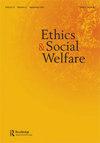护理愿景:在实证研究中建构女性主义护理伦理
IF 0.9
Q4 SOCIAL WORK
引用次数: 0
摘要
CareVisions(2022-2026)是一个跨学科的研究项目,反映了2019冠状病毒病大流行期间和之后的护理经验,以重新想象爱尔兰和国际上的护理关系、实践和政策。受女权主义伦理关怀观点和爱尔兰传统的关系和生活在社区的启发,概括在这句话中:我们生活在彼此的阴影和彼此的庇护下scáth a ch本文章由计算机程序翻译,如有差异,请以英文原文为准。
CareVisions: Enacting the Feminist Ethics of Care in Empirical Research
ABSTRACT CareVisions (2022–2026) is an interdisciplinary researcj project reflecting on care experiences during and beyond the COVID-19 pandemic to re-imagine care relations, practices and policies in Ireland and internationally. Inspired by feminist ethics of care perspectives and Irish traditions of relatedness and living in the community, epitomised in the quote: Is ar scáth a chéile a mhaireann na daoine (We live in each other's shadow and in each other's shelter) (Higgins, M. 2021. Letter from the President of Ireland to the President of the United States of America, 20thJanuary 2021. Accessed 18 January 2022. https://twitter.com/PresidentIRL/status/1352162151817949184?s=20Q2), CareVisions prioritises the creation of deliberative and participative spaces to enable care debates from a wide and diverse range of voices. Thus, the project's essence required examination of and attention to ‘care-full' internal and external working relations. Informed by an advisory group comprised of care practitioners, researchers and activists, CareVisions' ethical statement recognises that adopting this approach requires a focus on ‘a dialogic and narrative form of practice' (Barnes et al. 2015b:238).This paper focuses on the process of conceptualising, operationalising and illustrating a feminist ethics of care from the early stages of the project’s development and in approaching its empirical studies.
求助全文
通过发布文献求助,成功后即可免费获取论文全文。
去求助
来源期刊

Ethics and Social Welfare
SOCIAL WORK-
CiteScore
1.60
自引率
20.00%
发文量
36
期刊介绍:
Ethics and Social Welfare publishes articles of a critical and reflective nature concerned with the ethical issues surrounding social welfare practice and policy. It has a particular focus on social work (including practice with individuals, families and small groups), social care, youth and community work and related professions. The aim of the journal is to encourage dialogue and debate across social, intercultural and international boundaries on the serious ethical issues relating to professional interventions into social life. Through this we hope to contribute towards deepening understandings and further ethical practice in the field of social welfare. The journal welcomes material in a variety of formats, including high quality peer-reviewed academic papers, reflections, debates and commentaries on policy and practice, book reviews and review articles. We actively encourage a diverse range of contributions from academic and field practitioners, voluntary workers, service users, carers and people bringing the perspectives of oppressed groups. Contributions might include reports on research studies on the influence of values and ethics in social welfare practice, education and organisational structures, theoretical papers discussing the evolution of social welfare values and ethics, linked to contemporary philosophical, social and ethical thought, accounts of ethical issues, problems and dilemmas in practice, and reflections on the ethics and values of policy and organisational development. The journal aims for the highest standards in its published material. All material submitted to the journal is subject to a process of assessment and evaluation through the Editors and through peer review.
 求助内容:
求助内容: 应助结果提醒方式:
应助结果提醒方式:


